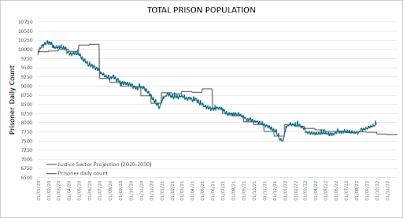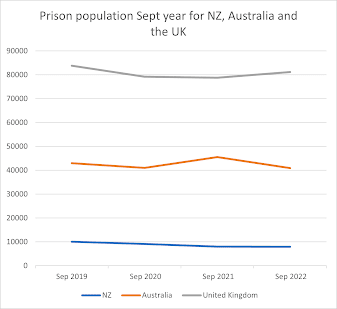Appalling crime story after appalling crime story gets reported.
But media rarely report on the big decline in New Zealand's prison population.
There are various possible explanations for the reduction including demographic change, policy changes in police and justice procedures, and/or less imprisonable crime being committed. Government politicians claim less crime is being committed, especially by youth, "according to the statistics". But the statistics they use - apprehension, prosecution and conviction - rely on those activities actually occurring. If the police are instructed not to pursue a fleeing vehicle, then the ensuing apprehension etc. is less likely to happen.
When Labour became government Kelvin Davis stated a goal of reducing the prison population and set about doing so. This is one policy goal they've actually achieved. But at what cost?
The prison population reduced by over twenty percent between September 2019 and 2022. It could be said that one in five people who should be in prison are not so it's hardly surprising the country is experiencing a "crime wave". But that proposition is barely provable.
What we can usefully look at is how New Zealand compares to two very similar countries - Australia and the United Kingdom.
The first chart shows the change in numbers:
The large difference in prison population numbers disguises the degree of change so I've plotted percentage-change separately:
The last grouping shows that between 2019 and 2022 Australia (-4.8%) and the UK (-3%) also saw prison population falls but they are much smaller than NZ's (-20.7%)
The deviation implies NZ's decline is very much a matter of policy and not the social and demographic factors that affect prison populations.
You will note from the first chart that the NZ prison population is starting to climb again. A campaign to attract more staff to Corrections has been high profile. The government may now be abandoning their experiment.
Tragically it is too late for some though.
Bill English may have been right when he described prisons as a fiscal and moral failure. They certainly don't rehabilitate every inmate. They don't even come close. Far more needs to be done within prisons in that regard.
But prisons serve another purpose. They protect the public from dangerous people. That aspect of their place in society seems to have been overlooked in recent years.



